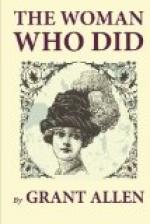He was a younger man by many years than poor Alan had been; about Herminia’s own age; a brilliant economist with a future before him. He aimed at the Cabinet. When first he met Herminia he was charmed at one glance by her chastened beauty, her breadth and depth of soul, her transparent sincerity of purpose and action. Those wistful eyes captured him. Before many days passed he had fallen in love with her. But he knew her history; and, taking it for granted she must still be immersed in regret for Alan’s loss, he hardly even reckoned the chances of her caring for him.
’Tis a common case. Have you ever noticed that if you meet a woman, famous for her connection with some absorbing grief, some historic tragedy, you are half appalled at first sight to find that at times she can laugh, and make merry, and look gay with the rest of us. Her callous glee shocks you. You mentally expect her to be forever engaged in the tearful contemplation of her own tragic fate; wrapt up in those she has lost, like the mourners in a Pieta. Whenever you have thought of her, you have connected her in your mind with that one fact in her history, which perhaps may have happened a great many years ago. But to you, it is as yesterday. You forget that since then many things have occurred to her. She has lived her life; she has learned to smile; human nature itself cannot feed for years on the continuous contemplation of its own deepest sorrows. It even jars you to find that the widow of a patriotic martyr, a murdered missionary, has her moments of enjoyment, and must wither away without them.
So, just at first, Harvey Kynaston was afraid to let Herminia see how sincerely he admired her. He thought of her rather as one whose life is spent, who can bring to the banquet but the cold dead ashes of a past existence. Gradually, however, as he saw more and more of her, it began to strike him that Herminia was still in all essentials a woman. His own throbbing heart told him so as he sat and talked with her. He thrilled at her approach. Bit by bit the idea rose up in his mind that this lonely soul might still be won. He set to work in earnest to woo and win her.
As for Herminia, many men had paid her attentions already in her unwedded widowhood. Some of them, after the fashion of men, having heard garbled versions of her tragic story, and seeking to gain some base advantage for themselves from their knowledge of her past, strove to assail her crudely. Them, with unerring womanly instinct, she early discerned, and with unerring feminine tact, undeceived and humbled. Others, genuinely attracted by her beauty and her patience, paid real court to her heart; but all these fell far short of her ideal standard. With Harvey Kynaston it was different. She admired him as a thinker; she liked him as a man; and she felt from the first moment that no friend, since Alan died, had stirred her pulse so deeply as he did.




